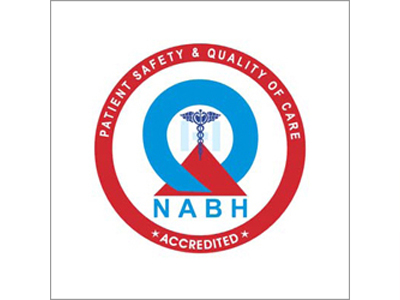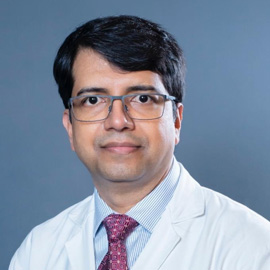Dr Muralidhar Ramappa, MD
Designation: Head, Center for Rare Eye Diseases and Ocular Genetics
Senior Faculty, Pediatric Cornea and Anterior Segment,
L V Prasad Eye Institute (LVPEI), Hyderabad, India Specialisation: Cornea & Anterior Segment, Cataract, Children's Eye Care Email: muralidhar@lvpei.org Location: Kallam Anji Reddy Campus, Hyderabad
Education and Training
- MD Ophthalmology, Minto Regional Institute of Ophthalmology, Bangalore Medical College, Bangalore (2002–2005)
- Fellowship in Cornea and Anterior Segment, L V Prasad Eye Institute, Hyderabad (2007-2007)
- Postdoctoral Fellowship in Pediatric Corneal Disorders, UPMC Children’s Hospital, Pittsburgh, USA (2013-14)
- Postdoctoral Fellowship in Pediatric Ophthalmology, Storm Eye Institute, Medical University of South Carolina (MUSC), USA (2012-13)
- Advanced Fellowship in Cataract and Refractive Surgery, Magill Laser Vision Center, MUSC, USA (2012-13)
Dr. Muralidhar Ramappa, MD, is a clinician-scientist with a focus on pediatric corneal disorders, rare eye diseases, and ocular genetics. His clinical and academic work is directed toward improving outcomes for children with complex corneal conditions and developmental ocular anomalies. Over the past two decades, he has contributed to the development of a structured, multidisciplinary approach to pediatric corneal care at LVPEI, leading to one of the most comprehensive programs in this domain.
He has established and maintained a pediatric corneal transplantation registry that includes over 5,500 children who have undergone keratoplasty. This database spans a wide spectrum of developmental anomalies, corneal dystrophies, and rare ocular diseases, supporting both clinical care and translational research.
In 2007, Dr. Ramappa initiated the focused Pediatric Cornea Service at LVPEI. This program, among the first of its kind in India, has provided specialized care to children with corneal blindness and related disorders. Under his leadership, the service has evolved into a recognized center for the evaluation and management of rare and severe pediatric ocular diseases. His work reflects a commitment to patient-centered care, particularly in resource-limited settings, and has served as a model for similar programs in other regions.
Dr. Ramappa’s academic interests include developmental biology of the eye and the study of genotype–phenotype relationships in congenital corneal anomalies. His clinical-genetic datasets represent one of the largest collections in the field, covering a range of rare conditions including congenital hereditary endothelial dystrophy (CHED), congenital hereditary stromal dystrophy (CHSD), posterior polymorphous corneal dystrophy (PPCD), aniridia-related spectrum (AXR) disorders, keratoglobus, corneal keloids, congenital corneal anesthesia, epidermolysis bullosa, and ectodermal dysplasia.
His translational research portfolio spans several inherited and acquired corneal disorders, including epithelial basement membrane dystrophy (EBMD), anterior basement membrane dystrophy (ABMD), granular dystrophy, lattice dystrophy, Schnyder’s crystalline corneal dystrophy, X-linked corneal endothelial dystrophy (XCED), and gelatinous drop-like keratopathy (GDLD). He is currently leading the development of a pediatric corneal single-cell transcriptomic atlas to better define transcriptional regulators in ocular development and disease. His investigations into the biomechanical effects of diabetes on the cornea have introduced new perspectives on early diagnosis and management of diabetic ocular complications.
Dr. Ramappa has also contributed several surgical innovations tailored to pediatric patients. These include the SEPA (Selective Endothelial Preservation and Apposition) technique for Peters anomaly, limbo-keratoplasty for sclerocornea, pediatric Descemet stripping automated endothelial keratoplasty (DSAEK), deep anterior lamellar keratoplasty (DALK), sclerotherapy for implantation cysts, and a modified iris-claw intraocular lens fixation technique using a “nail” approach for aphakia. These techniques have expanded the surgical repertoire for managing complex pediatric cases and are referenced in academic and clinical training programs. He also has expertise in premium intraocular lens (IOL) solutions for cataract and refractive needs.
He serves as Principal Investigator on multiple projects funded by national and international agencies, including clinical trials, genetic and immunological studies, and research in developmental biology and regenerative therapies. Among these is a Phase II industry-sponsored trial evaluating topical NSAIDs in CHED.
Dr. Ramappa has authored more than 150 peer-reviewed publications and contributed chapters to several textbooks in ophthalmology. He is an invited speaker and surgical instructor at both national and international scientific meetings, and serves on editorial and peer review boards of several journals. His academic collaborations with international experts such as Dr. Ken Nischal, Dr. Edward Wilson, and Dr. Deepak Edward reflect the global engagement of his research and clinical work.
In his role as an educator, Dr. Ramappa has trained over 250 fellows and residents, many of whom now serve in leadership roles in academic and clinical settings across India and internationally. His contributions to mentorship and skills development have had a sustained impact on the field.
Dr. Ramappa has received over 45 awards in recognition of his contributions to ophthalmology, including the Senior Achievement Award from the American Academy of Ophthalmology (AAO), the International Hero Award from the All India Ophthalmological Society (AIOS) on three occasions, the Vaidya Ratna Award from the Mother Teresa Foundation, and Distinguished Service Awards from various professional bodies. These honors reflect acknowledgment by peers and professional organizations of his longstanding service in pediatric ophthalmology and rare eye diseases.
Corneal Neurotization (Leadership Note): Dr. Ramappa is also an internationally recognized opinion leader in corneal neurotization, with one of the largest clinical experiences globally in restoring corneal sensation in eyes with congenital or acquired anesthesia, positioning LVPEI as a global reference center for this surgery.



